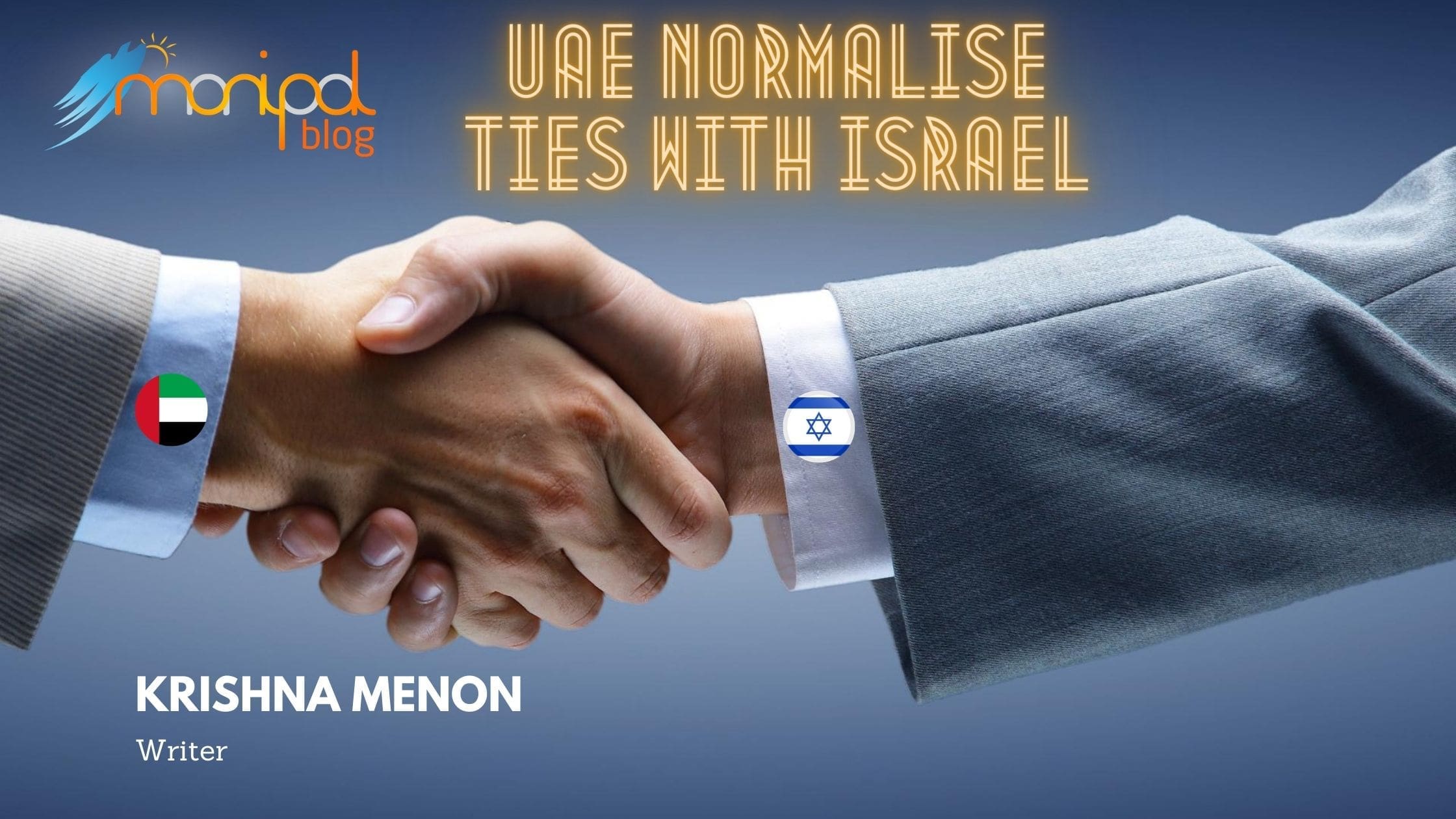
A brief history of Israel, Israel’s diplomatic relations, and the breakthrough 2020 Abraham accord.
A Brief History of Israel
To keep things brief, Israel is a small country located on the western side of Asia near Africa, with a minuscule area of around 20700 km sq. The area remains disputed with its neighbors for the most part. What makes the small country and it’s Jewish dominated population special is the fact that it has been subjected to turmoil and conflict throughout its history.
Israel is home to many of the world’s prominent religions. Jerusalem, a major city in Israel, is considered holy to followers of Islam, Christianity, and the Jews. In modern history, Palestine, which had a population of Jews and Arabs, fell under the reign of the Ottoman empire for almost 400 years, after which the Ottoman Empire retreated. It was during this time that the British mandate that was controlling Palestine decided to allot territory for the Jews to finally call homeland and live peacefully without oppression.
However, there were tensions as the Palestine Arabs disagreed with the idea of Jews getting territory in the very places that were sacred and holy for Islam. They feared subjugation if they had to stay in a country dominated by the Jews, and so the British split Palestine into Israel, modern-day Jordan, and some common ground with Egypt.
This was during the early 20th century when most of the driving forces of the religious and political movement of Zionism under Theodor Herzl was at play. The Jews wanted a secure homeland for themselves after the mistreatment of Jews living in other territories. They fled and settled in Palestine to claim and secure it for themselves. The Balfour Declaration and British mandate thus managed to carve out a Palestine for Jews that was formally recognized by the League of Nations in 1922.
After the Second World War, all the remaining Jews who escaped the wrath of the war fled to Israel and settled there peacefully. On 14th May 1948, the small country of Israel officially gained independence for its citizens. The Arabs, however, were unhappy with this settlement and refused to accept the identity of Israel as a separate country. This lead to constant conflicts and turbulence in the ensuing years.
Some prominent conflicts have been the war of independence (1948), the six-day war, the Lebanon war, and the Yom-Kippur war, to name a few. Despite not being recognized and oppressed by the majority of the neighboring Arab nations, Israel has come a long way in terms of its development, self-reliance, and vigor. It has not only managed to safeguard its citizens but also forged ahead in improving its economy.
Israel has been able to make peace with two of its four neighbors, Jordan and Egypt, respectively, and is pushing to normalize relations with the other gulf countries. Currently, its prime minister, Benjamin Netanyahu, is pushing to normalize relations with the UAE, to help secure a future for it’s almost nine million citizens.
Israel’s Diplomatic Relations
As you can see from the brief history of Israel, there are a few countries that do not accept the existence of Israel. Hence, Israel has hostile relations with these countries, the majority of whom constitute the Arab League. However, many states have excellent relations with Israel, and it has managed to normalize its relations with a few of its neighbors.
To start with, Israel has established and normalized relations with its then hostile neighbors, Jordan and Egypt, respectively, in 1979 and 1994. These were significant diplomatic breakthroughs and achievements for Israel as it slowly started to help the other Arab countries accept its identity. Israel has had very cordial relations with the US from the start, and they both continue diplomatic meetings and agreements wherever possible.
Present-day Israel is accepted by a healthy 162 out of 193 UN nations. Out of the remaining 30 odd countries, 19 are part of the Arab League, and the rest are countries mostly dominated by a Muslim majority population. Israel hopes to secure some peace and diplomatic ties in the Middle East while also ensuring that the defense and security of the country are not compromised in any way.
Israel has a strict no bowing down to terrorism policy and often goes the extra mile to ensure security and peace for its citizens. This can be gauged by some of the extraordinary operations conducted by their intelligence agency, Mossad. Israel’s economy thrives on its intelligence programs, manufacturing industry, digital technology, and media, with its capital city Tel Aviv acting as the primary hub.
Israel is easily one of the most economically and technologically developed countries in Asia and is known for exporting software products, machinery, arms, and jewelry. It also imports food grains, defense equipment, and consumer goods.
Israel has cordial relations with India and shares common ground and values on stopping terrorism. They have worked together on several operations before, and India also gets a majority of its arms and defense equipment from Israel. Israel also has strong ties with global superpowers such as China and the USA and takes big foreign policy decisions with the two superpowers as factors.
Apart from these countries, Israel also shares good relations with Greece and has bilateral agreements with most nations around the world.
Israel had achieved a significant breakthrough in diplomatic ties when it normalized relations with the UAE with the historic 2020 Abraham Accord.
The 2020 Abraham Accord
This is a monumental diplomatic achievement for Israel. The aim of this accord is to resolve the constant conflict and oppression of the Israeli people by the nations of the Middle East. The UAE though a small country, wields considerable diplomatic power with members of the Arab League. Gaining a foothold with the UAE will hopefully improve the scope of relations with the remaining Arab nations.
After its agreements with Jordan (1979) and Egypt (1994), the Abraham Accord marks a remarkable breakthrough after 26 years. The US played a considerable role in making sure that both the parties were in mutual agreement about normalizing their relations and played an integral part in being the mediator for the happy development to take place.
The UAE has generally been dismissive towards the status of Israel as a separate entity in the past. Therefore the recent developments come as a surprise and have the scope of ushering in much-needed stability and peace to the conflict-ridden region. As part of the Abraham Accord, Israel has pledged to stop annexation and the advancement of its troops on the Western Bank.
However, several nations of the middle east and the Arab League have not taken the signing of the Abraham Accord lightly. Most have condemned the development and stance taken by the UAE to strengthen ties with Israel. The Arab League views Israel as the greatest enemy to the Palestinians who belonged to the disputed lands. Iran and Turkey, in particular, seem to be most bitter about this agreement and have criticized the actions of the UAE.
The rest of the world has cheered the two countries for this historic achievement.
The Abraham Accord, apart from the geopolitical implications, provides for improved tourism, travel, trade, and open telecommunication channels between the two nations. The agreement is all set to be signed and put into effect starting September when the representatives of the two countries come together at the White house.
India, which has warm relations with both Israel and the UAE, would be thrilled with these developments.
With the success of the Abraham Accord, I feel Israel’s strategic plans for the future would be to focus on making peace and having diplomatic relations with the other gulf countries. At the risk of sounding naive, I believe that we may be looking at the beginning of lasting peace and stability in the Middle east.
 About the Author: Krishna Menon is a second-year student at Manipal Institute of Communication. Penning down my thoughts and visualizing outcomes, is what I like to do at heart, travel is my passion in the path of life, which only teaches us more as we tread ahead.
About the Author: Krishna Menon is a second-year student at Manipal Institute of Communication. Penning down my thoughts and visualizing outcomes, is what I like to do at heart, travel is my passion in the path of life, which only teaches us more as we tread ahead.

Be the first to comment